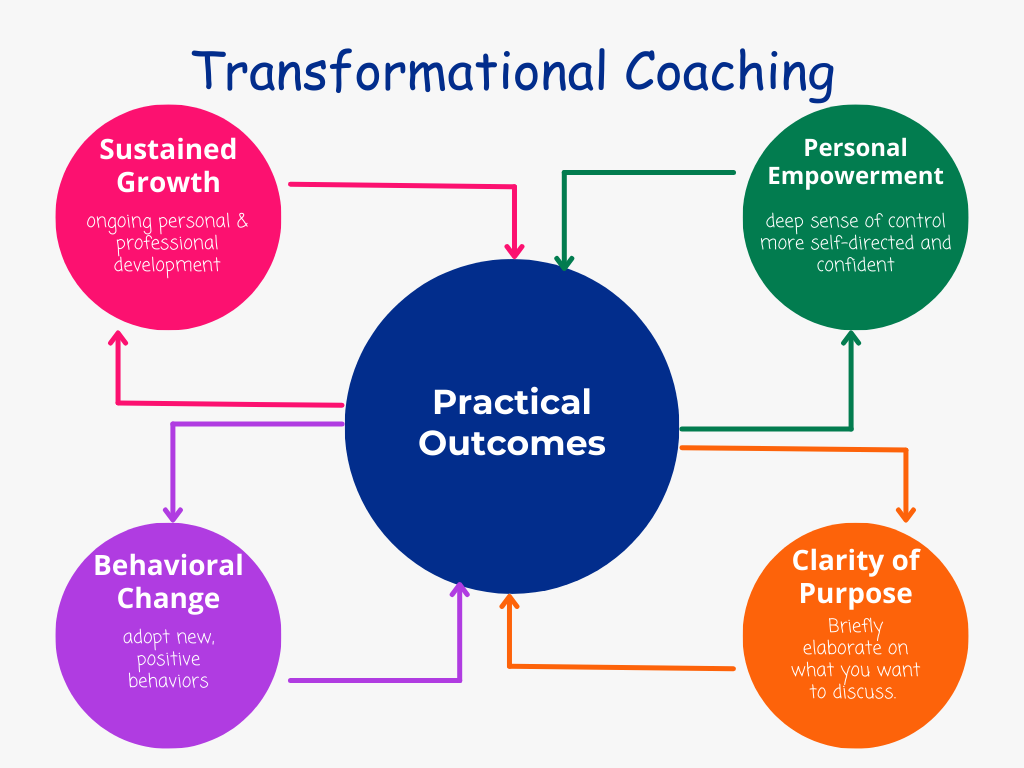Transformational coaching is a deep, holistic approach focused on facilitating profound personal growth and lasting change in an individual’s mindset, behaviours, and life outcomes. It goes beyond simply addressing immediate goals or challenges and encourages clients to explore their inner selves, realign their values, and cultivate a new sense of purpose. Here’s a detailed breakdown:

1. Focus on Deep Personal Growth
- Transformational coaching aims to help individuals achieve significant internal change by addressing deep-rooted beliefs, values, and patterns that shape their lives.
- It encourages self-awareness, self-reflection, and exploration of one’s purpose, helping clients understand themselves on a deeper level.
2. Mindset Shift
- A core element of transformational coaching is changing limiting beliefs, thought patterns, and perspectives that may be holding the client back.
- It helps clients shift from a fixed mindset to a growth mindset, empowering them to think differently about their challenges, goals, and potential.
3. Emphasis on Long-Term, Lasting Change
- Unlike transactional coaching, which focuses on short-term goals, transformational coaching aims for long-term, sustainable change.
- It doesn’t just address surface-level issues; it works to create shifts in identity and ways of being, leading to lasting transformation.
4. Holistic Approach
- Transformational coaching considers all aspects of an individual’s life—emotional, mental, physical, and spiritual—fostering growth in multiple areas, rather than focusing on a single problem.
- This holistic view encourages clients to connect the dots between different life domains (e.g., career, relationships, personal well-being) to ensure that changes are integrated into their overall life experience.
5. Focus on Inner Alignment and Purpose
- Transformational coaching emphasizes aligning actions and goals with an individual’s core values and life purpose.
- The coach helps the client discover or clarify their purpose, and empowers them to live in alignment with that purpose, leading to greater fulfillment and satisfaction in life.
6. Exploration of Beliefs and Identity
- A transformational coach works with clients to identify and challenge limiting beliefs and assumptions about themselves, the world, and their potential.
- Clients are encouraged to explore their identity, breaking free from past conditioning or labels that may limit their growth or happiness.
7. Change from the Inside Out
- While transactional coaching focuses on external tasks and goals, transformational coaching is about making changes internally, which then manifest externally.
- By addressing the root causes of thoughts, emotions, and behaviors, clients experience deep, meaningful change that naturally leads to external success.
8. Non-Directive and Empowering Approach
- Transformational coaches act as facilitators, guiding clients through self-discovery rather than providing direct solutions or instructions.
- The coach holds a space for clients to explore their thoughts, beliefs, and emotions, empowering them to find their own answers and build confidence in their decision-making.
9. Emotional and Psychological Depth
- Transformational coaching often involves emotional healing, helping clients navigate emotional blocks or unresolved issues that are affecting their ability to thrive.
- This approach can incorporate methods from positive psychology, mindfulness, and emotional intelligence to enhance emotional well-being and resilience.
10. Support in Achieving Self-Mastery
- The ultimate goal of transformational coaching is to guide clients toward self-mastery, where they take ownership of their thoughts, emotions, actions, and life outcomes.
- Clients develop the skills and mindset to become their best selves, overcoming challenges and adapting to future changes with confidence and grace.
Key Elements of Transformational Coaching:
- Self-Awareness: Helping clients become more aware of their thoughts, feelings, and actions.
- Mindset and Belief Shifts: Identifying and changing limiting beliefs and mindsets that hinder growth.
- Values Alignment: Ensuring clients’ actions are in harmony with their core values and purpose.
- Emotional Intelligence: Developing the ability to understand, manage, and leverage emotions effectively.
- Vision and Purpose: Assisting clients in defining and working towards a meaningful life purpose.
- Holistic Integration: Creating balance across all aspects of life—career, personal relationships, health, and well-being.
Practical Outcomes of Transformational Coaching:
- Personal Empowerment: Clients gain a deep sense of control over their lives, becoming more self-directed and confident.
- Clarity of Purpose: Clients become clear on their life’s direction and values, making decisions aligned with who they truly are.
- Behavioral Change: Through mindset shifts and emotional healing, clients can adopt new, positive behaviors that serve their long-term goals.
- Sustained Growth: The deep inner changes that occur in transformational coaching lead to ongoing personal and professional development.
Use Cases:
- Career Transitions: Helping individuals shift careers or take on new roles with confidence and clarity of purpose.
- Leadership Development: Assisting leaders in developing emotional intelligence, resilience, and an empowering leadership style.
- Life Transitions: Guiding individuals through major life changes, such as divorce, retirement, or relocation, helping them realign with their values and future vision.
- Overcoming Limiting Beliefs: Working with clients to dismantle deep-seated limiting beliefs that are keeping them from achieving their full potential.
In summary, transformational coaching is a comprehensive and profound process that facilitates lasting inner and outer transformation. It’s ideal for individuals seeking deep personal growth, purpose-driven change, and long-term fulfilment.


Leave a Reply